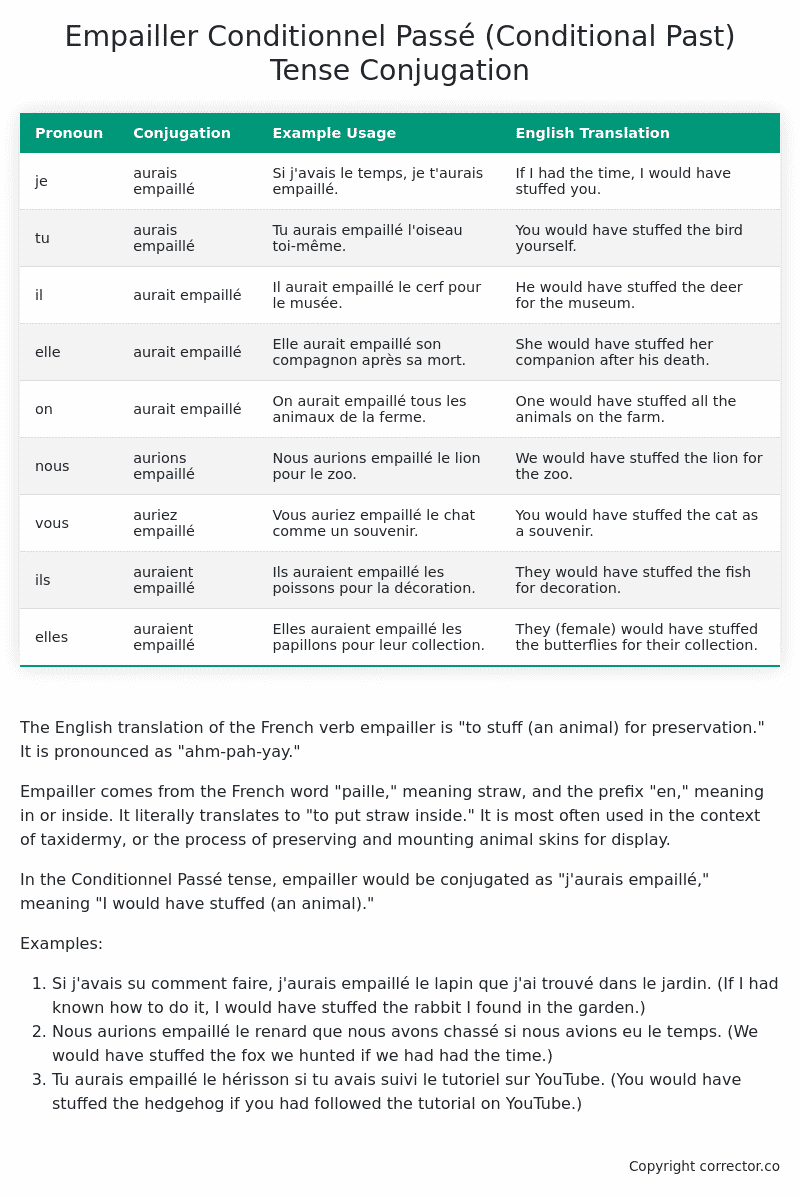Conditionnel Passé (Conditional Past) Tense Conjugation of the French Verb empailler
Introduction to the verb empailler
The English translation of the French verb empailler is “to stuff (an animal) for preservation.” It is pronounced as “ahm-pah-yay.”
Empailler comes from the French word “paille,” meaning straw, and the prefix “en,” meaning in or inside. It literally translates to “to put straw inside.” It is most often used in the context of taxidermy, or the process of preserving and mounting animal skins for display.
In the Conditionnel Passé tense, empailler would be conjugated as “j’aurais empaillé,” meaning “I would have stuffed (an animal).”
Examples:
- Si j’avais su comment faire, j’aurais empaillé le lapin que j’ai trouvé dans le jardin. (If I had known how to do it, I would have stuffed the rabbit I found in the garden.)
- Nous aurions empaillé le renard que nous avons chassé si nous avions eu le temps. (We would have stuffed the fox we hunted if we had had the time.)
- Tu aurais empaillé le hérisson si tu avais suivi le tutoriel sur YouTube. (You would have stuffed the hedgehog if you had followed the tutorial on YouTube.)
Table of the Conditionnel Passé (Conditional Past) Tense Conjugation of empailler
| Pronoun | Conjugation | Example Usage | English Translation |
|---|---|---|---|
| je | aurais empaillé | Si j’avais le temps, je t’aurais empaillé. | If I had the time, I would have stuffed you. |
| tu | aurais empaillé | Tu aurais empaillé l’oiseau toi-même. | You would have stuffed the bird yourself. |
| il | aurait empaillé | Il aurait empaillé le cerf pour le musée. | He would have stuffed the deer for the museum. |
| elle | aurait empaillé | Elle aurait empaillé son compagnon après sa mort. | She would have stuffed her companion after his death. |
| on | aurait empaillé | On aurait empaillé tous les animaux de la ferme. | One would have stuffed all the animals on the farm. |
| nous | aurions empaillé | Nous aurions empaillé le lion pour le zoo. | We would have stuffed the lion for the zoo. |
| vous | auriez empaillé | Vous auriez empaillé le chat comme un souvenir. | You would have stuffed the cat as a souvenir. |
| ils | auraient empaillé | Ils auraient empaillé les poissons pour la décoration. | They would have stuffed the fish for decoration. |
| elles | auraient empaillé | Elles auraient empaillé les papillons pour leur collection. | They (female) would have stuffed the butterflies for their collection. |
Other Conjugations for Empailler.
Le Present (Present Tense) Conjugation of the French Verb empailler
Imparfait (Imperfect) Tense Conjugation of the French Verb empailler
Passé Simple (Simple Past) Tense Conjugation of the French Verb empailler
Passé Composé (Present Perfect) Tense Conjugation of the French Verb empailler
Futur Simple (Simple Future) Tense Conjugation of the French Verb empailler
Futur Proche (Near Future) Tense Conjugation of the French Verb empailler
Plus-que-parfait (Pluperfect) Tense Conjugation of the French Verb empailler
Passé Antérieur (Past Anterior) Tense Conjugation of the French Verb empailler
Futur Antérieur (Future Anterior) Tense Conjugation of the French Verb empailler
Subjonctif Présent (Subjunctive Present) Tense Conjugation of the French Verb empailler
Subjonctif Passé (Subjunctive Past) Tense Conjugation of the French Verb empailler
Subjonctif Imparfait (Subjunctive Imperfect) Tense Conjugation of the French Verb empailler
Subjonctif Plus-que-parfait (Subjunctive Pluperfect) Tense Conjugation of the French Verb empailler
Conditionnel Présent (Conditional Present) Tense Conjugation of the French Verb empailler
Conditionnel Passé (Conditional Past) Tense Conjugation of the French Verb empailler (this article)
L’impératif Présent (Imperative Present) Tense Conjugation of the French Verb empailler
L’infinitif Présent (Infinitive Present) Tense Conjugation of the French Verb empailler
Struggling with French verbs or the language in general? Why not use our free French Grammar Checker – no registration required!
Get a FREE Download Study Sheet of this Conjugation 🔥
Simply right click the image below, click “save image” and get your free reference for the empailler Conditionnel Passé tense conjugation!

Empailler – About the French Conditionnel Passé (Conditional Past) Tense
Formation
Common Everyday Usage Patterns
Expressing Unreal Past Scenarios
Polite Requests or Suggestions
Expressing Doubt or Uncertainty
Interactions with Other Tenses
Conditional Present
Indicative Past Tenses
Conditional Future
Summary
Want More?
I hope you enjoyed this article on the verb empailler. Still in a learning mood? Check out another TOTALLY random French verb conjugation!


